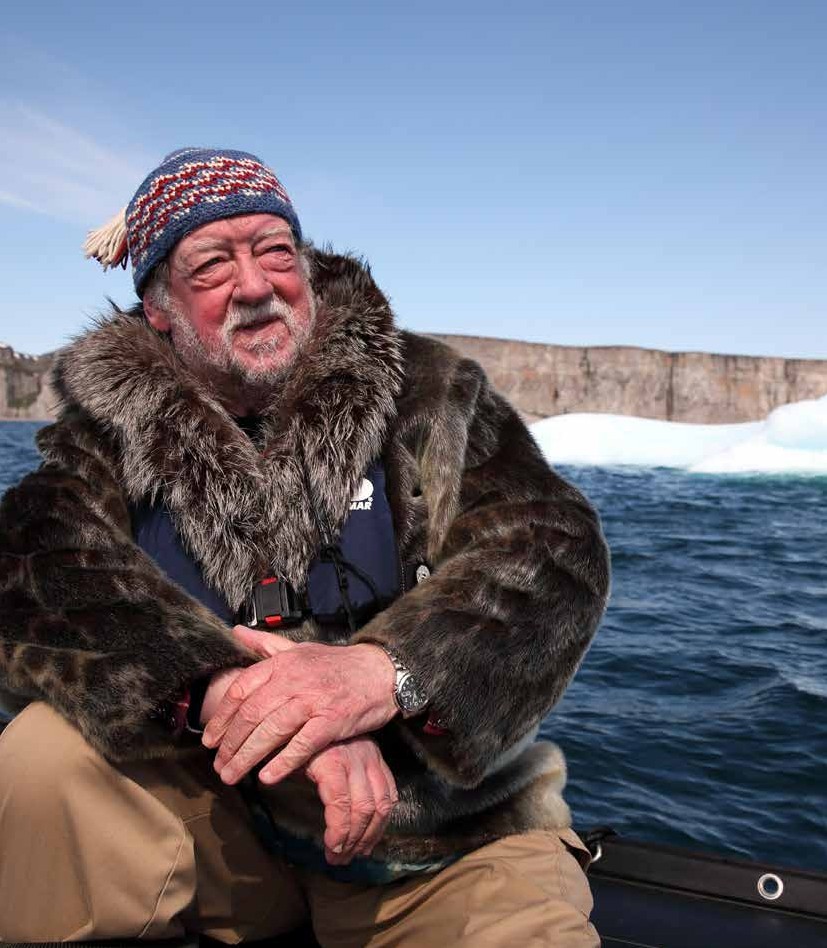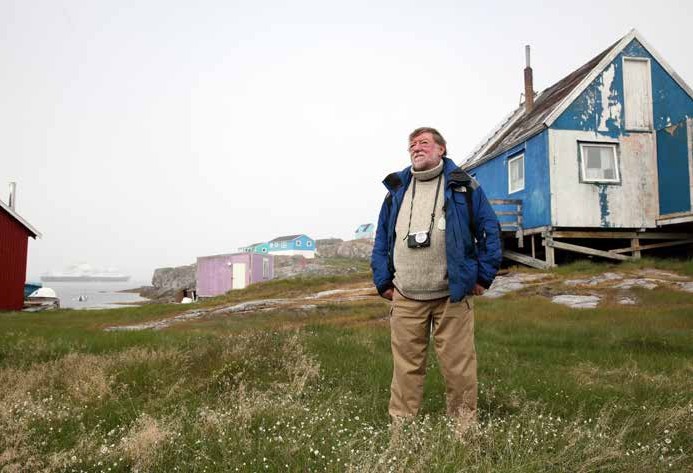Issue:

For some reason, he hated the name Clive, so to friends he was “Nic.” But to millions of Japanese fans he was CW Nicol, that beardy old white guy, author of 100 books and scads of newspaper columns in Japanese, subject of countless media interviews, and an orator who held the rapt attention of audiences nationwide. No one who has come to these shores in the past 60 years has had a greater impact on Japan: its society, likely; its biosphere, beyond doubt.
Nic’s great feat was to reawaken Japan’s awareness of the vast forest that blankets this country, and the hideous damage done to it since the 1940s. Although he never shied from forcefully pointing fingers where warranted, he went about this more by inspiring awe and love for the forest through storytelling that was always at its most powerful before a live audience. In a country inured to droning, stone faced orators, Nic’s singsong, Welsh inflected Japanese, his passionate stage presence, his humor and innate narrative genius left few who heard him unmoved.
He soon became such a widely beloved figure (and a Japanese citizen in 1995) that advertisers begged him to be their pitch man, notably Nippon Ham and Nikka Whisky (of whose product he was inordinately fond). This funding enabled him in 1985 to establish his own forest reserve, the Afan Wood land Trust in Kurohime, Nagano a 34-hectare tract lovingly restored over decades since. Afan attracted a stunning pro- cession of pilgrims, from Monty Python’s Michael Palin and Margaret Atwood all the way up to Prince Charles and even, in 2016, Emperor Akihito and Empress Michiko.
TOKYOITES MAY BE TEMPTED to think, “That’s nice, but so what?” You can live decades in the city only dimly aware that 70 percent of this archipelago is forest. You may occasionally golf on its edge or hike groomed trails on sunny afternoons when all the forest denizens lay low, but few actually go deep in the woods. If like me, however, you live alone, smack in the midst of a Chiba forest where macaques scamper on the roof, boars dig up the garden, owls land on the deck and poisonous mamushi snakes lurk beneath the barbecue, Nic was “The Guru” and I would devour his Old Nic’s Notebook columns in The Japan Times. Still, I never met him until...
Early in 2015 I was recruiting Japanese media and celebrity guests for an expedition voyage to the Canadian Arctic and Greenland, so I dropped him a line: “I have no budget to pay your usual fee, but I’ll ask anyway. We sail July 17 from Kuujjuaq, Quebec on the itinerary below. Call me if you want to come.” Thirty minutes later, the phone rang: “It’s Nic Nicol. I don’t care about the money; I want to go. July 17 is my 75th birthday and my adventures began at age 17 from Kuujjuaq, where I was sent as the ‘advance man’ for a bird research expedition.”
That was the start of a remarkable friendship that continued after two weeks at sea with hour long phone chinwags every couple of weeks and the occasional whisky fueled storytelling session. Our bond was a shared love of Canada’s Arctic and Japan’s forest.
IT HAS TO BE said. Nic was an unashamedly prodigious imbiber from 6pm on (or 5 if his agent wasn’t looking), happiest and most entertaining when under the influence. He’d show up with a ¥50,000 bottle of 1997 single malt (made specially for him by Nikka) and the tales would begin to flow with the booze.
Some say he never let the facts get in the way of a good story, but Nic stories grabbed from the get go. In his Welsh youth: “As a teenage wrestler I was making more money than my father, a Royal Navy officer.” In the Arctic: “When we over wintered in an igloo on Devon Island I was confronted by a polar bear. I had to shoot him, then stop my companions from eating the liver because y’know, polar bear liver is deadly poison.” From his late 1960s days as warden of Ethiopia’s Simien National Park: “I shot and killed seven men once: poachers. It had to be done.” And then: “Fought my last brawl in Matsumoto when I was nearly 70. I was jumped by some yakuza whose illegal forest dumping I’d outed.”
He was an affable bear of a man, but you didn’t want to cross him. Of course, not all his stories were so pugnacious but they always took you to magical places . . . until late in the evening when the booze inevitably got the better of him.
I often had to help him to his bedroom door, most memorably at the end of a long, boozy wild game barbecue on my deck with our local hunters. Well besotted ourselves, we had to drag his vast carcass on a rug to the sofa. And yet, Lazarus like he would rise in the morning fresh as a bloody daisy and off he’d go to give a speech, meet the Emperor or work on yet another book in Japanese. Few teetotallers could match that.
GUESS HOW HE CRANKED out all those Japanese books? Although a very fluent speaker, being illiterate in Japanese he wrote his manuscripts in long hand romaji which helpers then rendered into proper Japanese text. A bizarre method, but his narrative genius made it work.

CW Nicol on the Adventure Canada trip (photographed by Yoichi Yabe)
Sadly, he began to suffer reverses in recent years. After his youngest daughter an adult living far from home was jailed on drug charges, his corporate sponsors dropped Nic like a hot potato. Such is the measure of Japanese gratitude.
That left Nic in financial straits just as he was diagnosed with a virulent colon cancer. He fought it tenaciously through multiple surgeries, chemotherapy and costly proton beam treatments. He was cheerful, mostly sober and productive throughout, continuing a hectic pace of speeches. But increasingly his energies were focused on a last mountain unclimbed.
Famed though he was in in Japan, Nic’s few English books never got much notice in his native UK, or in Canada where he spent most of 20 years from 1958, becoming a citizen in 1967 or in that other large English speaking country. So, in and out of hospital, he began scribbling furiously, recounting all his stories in an English manuscript he called “Road to the Forest.”
He’d often phone to report his progress and (hugely honoring me) ask my advice on the Canadian stories he was most eager to tell. When Nic reached the Arctic in the late ‘50s, the indigenous Inuit were only just abandoning their nomadic ways in a painful transition to government built settlements. Working out on the land in wildlife research gave Nic a very rare chance to share the last days of their traditional existencean experience that affected him deeply. Knowing his testimony was important, he was determined to record it.
In late March, he phoned from a Tokyo hospital saying he had 80 chapters in the bag, maybe 200,000 to 400,000 words, along with hand drawn illustrations. “And I’ve got good news: the infection’s receded so end of the month I’m going home to Kurohime!”
Out walking in the woods on April 6 I suddenly thought to check on him and phoned only to learn he’d died four hours earlier. After a few good nights at home, the infection brought on by his chemo came raging back and he was rushed to hospital. Not 48 hours later Nic was gone.
What has he left behind? Apparently, he was near broke by the end. But as that enormous manuscript was almost done, we can at least look forward to a massive feast of Nic stories in English. Here’s hoping it attracts a reputable publisher able to give it the edit it deserves.
And what of Nic’s forest legacy? Sadly, Japan’s contempt for its forest wealth is so entrenched that optimism is a stretch. We can only hope the seeds of awareness he scattered from Hokkaido to Okinawa bear enough fruit to make a difference. Absent that, the forests’ best hope may be the aging and decline of the human population.
What Nic left me is the memory of how he used to sign off every phone call. “John,” he’d say, “you’re a dear friend.” Like wise, Nic. God rest ye, the merriest of gentlemen. ❶
John R. Harris is a Canadian speechwriter/journalist who lives in a forest near the surf beaches on Chiba’s Boso Peninsula. Since age 18, work has often taken him to Canada’s Far North.

